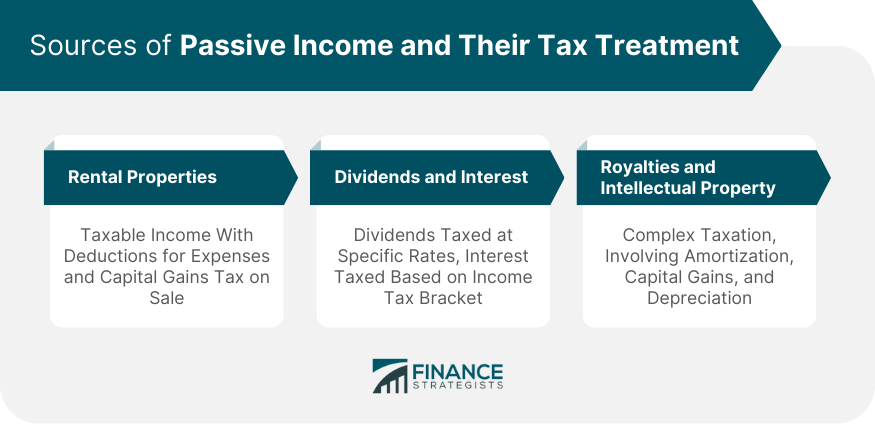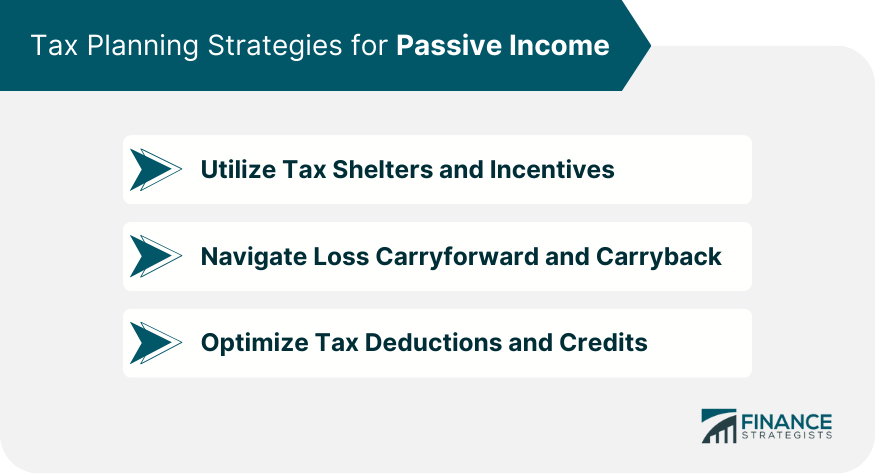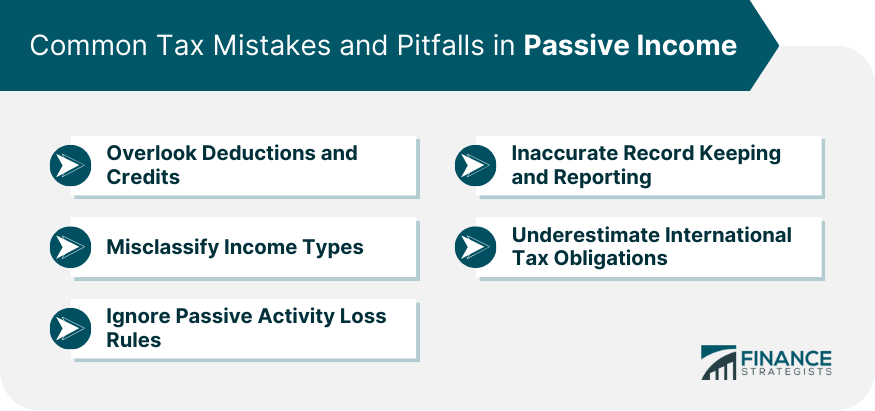Taxation of passive income follows specific principles that distinguish it from active income. Generally, passive income is subject to tax, but the rules and rates can differ markedly from those applied to active income. Active income, earned from employment or business activities, often faces different tax treatments compared to passive income. It's crucial for taxpayers to comprehend these differences to optimize their tax strategies and ensure compliance with tax laws. Understanding concepts such as taxable income, tax deductions, and credits is vital in navigating the complexities of passive income taxation. Rental properties are a common source of passive income. Income derived from renting out a property is taxable, but landlords can avail of various deductions and allowances, such as mortgage interest, property taxes, maintenance costs, and depreciation. These deductions can significantly reduce the taxable income from rentals. However, when a rental property is sold, capital gains tax considerations come into play. The difference between the selling price and the adjusted basis of the property is subject to capital gains tax. Understanding these tax implications is crucial for property owners to make informed financial decisions. Dividends received from investments in stocks or mutual funds are another form of passive income. These dividends are subject to tax at specific rates, which can differ from ordinary income tax rates. Taxpayers need to understand the distinction between qualified and non-qualified dividends, as this affects the tax rate applied. Interest income, such as that earned from savings accounts or bonds, is also taxable. The tax rate on interest income usually aligns with the individual's income tax bracket. It's essential for investors to report this income accurately to avoid penalties and ensure proper tax compliance. Royalties, often earned from intellectual property like patents, copyrights, or mineral rights, constitute another type of passive income. The taxation of royalties can be complex, involving considerations like the amortization of intellectual property and the distinction between capital gains and ordinary income. Intellectual property owners must also navigate the intricacies of depreciation. Depreciating the value of intellectual property over its useful life can provide significant tax benefits, but it requires a deep understanding of the relevant tax laws and regulations. The Internal Revenue Service (IRS) has specific rules regarding passive activities, particularly the treatment of losses. Passive activity loss rules restrict the ability to offset other types of income with losses from passive activities. Understanding these rules is crucial for taxpayers to properly report their income and avoid potential penalties. Material participation tests are a critical aspect of IRS regulations on passive income. These tests determine whether an individual's involvement in an activity is substantial enough to classify the income as active rather than passive. Comprehending these rules is essential for accurate tax reporting. Adhering to the IRS's reporting requirements for passive income is fundamental for tax compliance. Taxpayers must accurately report their passive income and understand the relevant forms and documentation needed to avoid penalties and ensure proper tax filings. This includes being aware of different thresholds and criteria for various types of passive income. Effective tax planning for passive income often involves utilizing tax shelters and incentives. These can include specific investment vehicles, such as certain retirement accounts, which offer tax advantages for passive income. Understanding these options can help taxpayers minimize their tax liability and maximize their income. Loss carryforward and carryback provisions are strategic tools for managing taxes on passive income. These provisions allow taxpayers to offset current year profits with losses from previous years, or vice versa, providing a means to balance out income and reduce overall tax liability. Maximizing tax deductions and credits related to passive income sources is crucial in tax planning. Taxpayers should be aware of all potential deductions and credits to ensure they are not paying more in taxes than necessary. This involves staying informed about changes in tax laws and consulting with tax professionals if needed. One common mistake in passive income taxation is overlooking potential deductions and credits. Taxpayers may miss out on opportunities to reduce their taxable income by not taking full advantage of allowable deductions related to their passive income sources. Misclassifying income types is a significant pitfall. Incorrectly categorizing income as passive when it is actually active, or vice versa, can lead to miscalculations in tax liability and potential issues with tax authorities. Accurate classification is key to proper tax reporting and compliance. Many taxpayers fail to adequately understand or apply passive activity loss rules, leading to errors in their tax filings. This lack of awareness can restrict the ability to use passive losses to offset other income, resulting in higher tax liabilities. Inaccurate record-keeping and reporting of passive income can lead to significant issues with tax authorities. It's crucial for taxpayers to maintain accurate financial records and report their passive income correctly to avoid penalties and audits. Taxpayers often underestimate the complexities of international taxation regarding passive income. Failing to report foreign passive income or misunderstanding tax treaties can result in severe compliance issues and financial penalties. The taxation of passive income encompasses a broad spectrum of considerations, ranging from understanding general tax principles to navigating specific IRS rules and regulations. For taxpayers, it is essential to distinguish between different sources of passive income, such as rental properties, dividends, interest, and royalties, each with its own tax implications. Effective tax planning strategies, including the utilization of tax shelters, navigating loss carryforward and carryback provisions, and optimizing deductions and credits, play a pivotal role in minimizing tax liabilities and maximizing income. Common pitfalls like overlooking deductions, misclassifying income types, and underestimating international tax obligations can lead to costly errors. Therefore, maintaining accurate records and staying informed about tax laws and regulations are key to ensuring compliance and making informed financial decisions in the realm of passive income taxation.General Tax Principles for Passive Income
Sources of Passive Income and Their Tax Treatment
Rental Properties
Dividends and Interest From Investments
Royalties and Intellectual Property

IRS Rules and Regulations on Passive Income
Understand Passive Activity Loss Rules
Navigate Material Participation Tests
Comply With Reporting Requirements
Tax Planning Strategies for Passive Income
Utilize Tax Shelters and Incentives
Navigate Loss Carryforward and Carryback
Optimize Tax Deductions and Credits

Common Tax Mistakes and Pitfalls in Passive Income
Overlook Deductions and Credits
Misclassify Income Types
Ignore Passive Activity Loss Rules
Inaccurate Record Keeping and Reporting
Underestimating International Tax Obligations

Bottom Line
Passive Income Taxation FAQs
Passive income generally includes earnings from activities in which the taxpayer does not actively participate, such as rental properties, dividends, interest from investments, and royalties from intellectual property.
Income from rental properties is taxed as passive income. Landlords can take advantage of various deductions like mortgage interest, property taxes, and maintenance costs. Additionally, capital gains tax applies when selling a rental property.
Qualified dividends are taxed at a lower capital gains rate, whereas non-qualified dividends are taxed as ordinary income. The classification depends on factors like the holding period and the type of stock.
The IRS restricts the ability to offset other types of income with losses from passive activities. Understanding passive activity loss rules is crucial to avoid penalties and optimize tax filings.
Common mistakes include overlooking deductions and credits, misclassifying income types, failing to understand passive activity loss rules, inaccurate record-keeping and reporting, and underestimating international tax obligations. It's important for taxpayers to stay informed and possibly consult a tax professional to avoid these pitfalls.
True Tamplin is a published author, public speaker, CEO of UpDigital, and founder of Finance Strategists.
True is a Certified Educator in Personal Finance (CEPF®), author of The Handy Financial Ratios Guide, a member of the Society for Advancing Business Editing and Writing, contributes to his financial education site, Finance Strategists, and has spoken to various financial communities such as the CFA Institute, as well as university students like his Alma mater, Biola University, where he received a bachelor of science in business and data analytics.
To learn more about True, visit his personal website or view his author profiles on Amazon, Nasdaq and Forbes.















